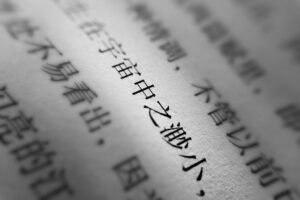Table of Contents
ToggleIntroduction
In the age of global interconnectivity, understanding the intricacies of banking and finance in the world’s second-largest economy, China, is essential. Whether you’re a businessperson, investor, or expatriate, navigating the Chinese financial landscape requires a grasp of key terms and concepts.
人民币 (Rénmínbì – RMB)
Renminbi, or RMB for short, is the name of the People’s Republic of China’s official currency. The most recognizable unit of RMB is the 元/圆 (yuán), commonly referred to in English as the “yuan.” Understanding the currency is the first step in any financial transaction in China, from investment to purchasing.
央行 (Yāngháng – Central Bank)
The People’s Bank of China (PBOC) is the central bank of China, playing roles similar to the Federal Reserve in the United States or the European Central Bank in Europe. It regulates monetary policy, maintains financial stability, and issues the currency.
存款 (Cúnkuǎn – Deposit)
In Chinese banking, “cúnkuǎn” refers to the money deposited into a bank account. There are various types of deposit accounts in China, including 活期存款 (huóqī cúnkuǎn – current or checking deposits) and 定期存款 (dìngqī cúnkuǎn – fixed deposits).
贷款 (Dàikuǎn – Loan)
When it comes to borrowing money, “dàikuǎn” is a critical term. Chinese banks offer several types of loans, such as 个人贷款 (gèrén dàikuǎn – personal loans), 房贷 (fángdài – mortgage loans), and 企业贷款 (qǐyè dàikuǎn – business loans).
利率 (Lìlǜ – Interest Rate)
Interest rates in China are set by the PBOC and are a key indicator of the cost of borrowing money or the returns on deposits. Knowing the current interest rates is crucial for financial planning and investment decisions.
外汇 (Wàihuì – Foreign Exchange)
The term “wàihuì” refers to foreign currencies and the practice of exchanging one currency for another. This is particularly relevant for foreign investment in China, repatriation of profits, or international trade.
股市 (Gǔshì – Stock Market)
China’s stock market is an increasingly important arena for both domestic and international investors. The two main stock exchanges are the 上海证券交易所 (Shànghǎi Zhèngquàn Jiāoyìsuǒ – Shanghai Stock Exchange) and the 深圳证券交易所 (Shēnzhèn Zhèngquàn Jiāoyìsuǒ – Shenzhen Stock Exchange).
支付系统 (Zhīfù xìtǒng – Payment System)
China has a robust and innovative payment system. Familiarize yourself with electronic payment platforms like 支付宝 (Zhīfùbǎo – Alipay) and 微信支付 (Wēixìn Zhīfù – WeChat Pay), which have revolutionized retail transactions in China.
信用卡 (Xìnyòngkǎ – Credit Card)
Credit cards, while not as dominant as digital payment platforms, are still used in China. Major Chinese banks issue credit cards, and international credit card companies also operate within the country.
金融市场 (Jīnróng Shìchǎng – Financial Market)
The term “jīnróng shìchǎng” encompasses the entirety of the financial markets in China, including the money market, capital market, derivatives market, and the foreign exchange market.
Conclusion
Understanding these key terms will provide you with a fundamental lexicon to navigate the complexities of the Chinese banking and finance sector. The country’s financial system is vast and dynamic, reflecting its position as a global economic powerhouse. The importance of being able to handle money well within this framework will only increase for international players as China opens up its financial markets to the globe. Making sure you stay up to date with the latest developments and expand your knowledge of the key concepts and workings will guarantee that you’re prepared to make wise financial choices in the Chinese setting.
FAQ: Chinese Banking and Finance Key Terms
Q: What is RMB?
A: The People’s Republic of China’s official currency is the yuan, or RMB for short. Its primary unit is the yuan (元/圆).
Q: Who regulates the Chinese banking system?
A: The Chinese banking system is regulated by the People’s Bank of China (PBOC), which functions as the central bank of the country.
Q: What are the different types of bank deposits in China?
A: In China, the two main types of bank deposits are current or checking deposits (活期存款 – huóqī cúnkuǎn) and fixed deposits (定期存款 – dìngqī cúnkuǎn).
Q: How do interest rates affect financial decisions in China?
A: Interest rates, set by the PBOC, affect the cost of borrowing (e.g., loans) and the returns on deposits, influencing financial planning and investment decisions.
Q: What does “wàihuì” mean?
A: “Wàihuì” refers to foreign exchange, involving the practice of trading and converting different currencies.
Q: Are electronic payments popular in China?
A: Yes, electronic payments are very popular in China, with platforms like Alipay (支付宝) and WeChat Pay (微信支付) dominating the retail transaction space.
Q: Can I use credit cards in China?
A: Credit cards are used in China, and they are issued by both national banks and international credit card companies.
Q: What is the scope of the term “金融市场” (Jīnróng Shìchǎng)?
A: “金融市场” (Jīnróng Shìchǎng) refers to the financial markets in China, which include the money market, capital market, derivatives market, and foreign exchange market.
Q: How essential is it to understand these financial terms when doing business in China?
A: Understanding these financial terms is crucial for managing finances effectively and making informed decisions when doing business in China, as the country’s economic systems have unique characteristics that can impact both domestic and international economic activities.
Contact our head teacher, Chen Huimin, at info@lcchineseschool.com if you want to learn Chinese or have additional questions about our Chinese programs.
Sign up for a free trial class here.
Learn about our Internship Program in China.
Get free Chinese learning resources.
Learn about China’s 2024 Offical Holiday Schedule







